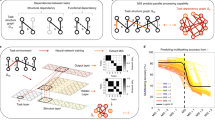Abstract
Andrew Boucher (1997) argues that ``parallel computation is fundamentally different from sequential computation'' (p. 543), and that this fact provides reason to be skeptical about whether AI can produce a genuinely intelligent machine. But parallelism, as I prove herein, is irrelevant. What Boucher has inadvertently glimpsed is one small part of a mathematical tapestry portraying the simple but undeniable fact that physical computation can be fundamentally different from ordinary, ``textbook'' computation (whether parallel or sequential). This tapestry does indeed immediately imply that human cognition may be uncomputable.
Similar content being viewed by others
References
Barwise, J. and Etchemendy, J. (1993), Turing's World 3.0, Stanford, CA: CSLI.
Boucher, A. (1997), 'Parallel machines', Minds and Machines 7, pp. 542–551.
Lewis, H. and Papaimitriou, C. (1981), Elements of the Theory of Computation, Englewood Cliffs, NJ: Prentice Hall.
Siegelmann, H. and Sontag, E. (1994), 'Analog computation via neural nets', Theoretical Computer Science 131, pp. 331–360.
Author information
Authors and Affiliations
Rights and permissions
About this article
Cite this article
Bringsjord, S. In Computation, Parallel is Nothing, Physical Everything. Minds and Machines 11, 95–99 (2001). https://doi.org/10.1023/A:1011257022242
Issue Date:
DOI: https://doi.org/10.1023/A:1011257022242




